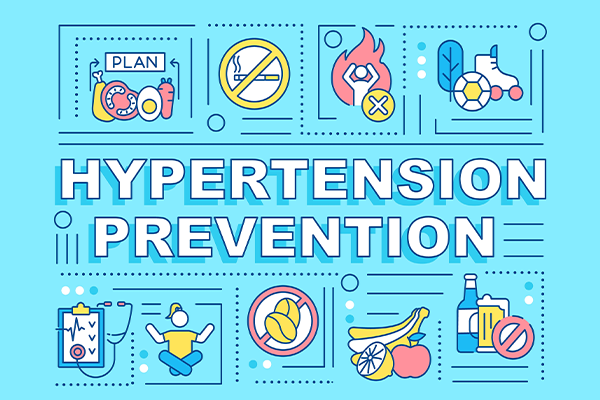
Hypertension, or high blood pressure, is a major global health issue affecting millions of people. If left unmanaged, it can lead to severe health complications, including heart disease, stroke, and kidney damage. Fortunately, Management of hypertension can often be controlled or even prevented through meaningful lifestyle changes. This blog will explore the top 10 lifestyle changes to manage hypertension and improve overall heart health effectively.
Synopsis
Top 10 Lifestyle Changes To Manage Hypertension
1. Adopt a Heart-Healthy Diet
The right diet can significantly reduce your blood pressure. Consider the following dietary changes:
-
Dietary management of hypertension: The Dietary Approaches to Stop Hypertension (DASH) diet is specifically designed to lower blood pressure. It emphasizes fruits, vegetables, whole grains, lean proteins, and low-fat dairy while limiting saturated fats and sugar.
-
Reduce Sodium Intake: Aim for less than 1,500 to 2,300 mg of sodium per day. Use herbs and spices instead of salt to flavour your meals.
-
Increase Potassium: Foods like bananas, oranges, sweet potatoes, and spinach can help balance the negative effects of sodium.
2. Maintain a Healthy Weight
Excess body weight is closely linked to high blood pressure. Losing even a small amount of weight can have a big impact. Aim for a healthy body mass index (BMI) and focus on reducing abdominal fat, which is particularly risky for heart health.
3. Exercise Regularly
Physical activity strengthens the heart and helps lower blood pressure. The American Heart Association recommends:
-
150 minutes of moderate aerobic exercise (like brisk walking or cycling) each week, or
-
75 minutes of vigorous exercise (like running or HIIT workouts).

4. Manage Stress
Chronic stress can significantly contribute to hypertension. To reduce stress:
-
Practice deep breathing exercises or meditation.
-
Spend time in nature or with loved ones.
-
Prioritize sleep and maintain a healthy work-life balance.
5. Limit Alcohol and Caffeine
Both alcohol and caffeine can elevate blood pressure. Limit alcohol to no more than one drink per day for women and two for men. Reduce your caffeine intake if you notice it spikes your blood pressure.
6. Quit Smoking
Smoking damages blood vessels and raises blood pressure. Quitting smoking improves heart health almost immediately and significantly reduces your long-term risk of heart disease.
7. Monitor Your Blood Pressure Regularly
Keep track of your blood pressure at home using a reliable monitor. Regular checks help you and your healthcare provider assess the effectiveness of your lifestyle changes and align with Home management of hypertension guidelines.
8. Reduce Processed and Sugary Foods
Highly processed foods are often loaded with hidden salt, sugar, and unhealthy fats. Replace these with whole, nutrient-dense options to support heart health.
9. Get Quality Sleep
Poor sleep can contribute to high blood pressure. Aim for 7-8 hours of quality sleep each night to help regulate your cardiovascular system.
10. Seek Professional Support
Consult with healthcare professionals for personalized advice. This might include working with a dietitian, personal trainer, or therapist to support your blood pressure management goals, aligning with Hypertension management guidelines.
Table: Quick Lifestyle Changes for Hypertension Management
|
Lifestyle Change |
Key Benefit |
|
Heart-Healthy Diet |
Lowers sodium and increases potassium |
|
Regular Exercise |
Strengthens the heart, lowers pressure |
|
Stress Management |
Reduces stress-induced spikes |
|
Weight Loss |
Reduces strain on the heart |
|
Quitting Smoking |
Improves blood vessel function |
Conclusion
Adopting these lifestyle changes can make a significant difference in managing hypertension and improving your overall health. For those looking for expert guidance, consider consulting the experienced cardiologists at Manipal Hospitals Dwarka, where advanced heart care meets compassionate treatment. Book your consultation today to take control of your heart health.
FAQ's
Dietary management of hypertension includes the DASH diet, which is rich in fruits, vegetables, lean proteins, and whole grains. It helps reduce sodium intake, increase potassium, and control blood pressure. This balanced approach can significantly reduce the risk of heart disease and stroke.
Yes, Home management of hypertension can be effective for some patients. Lifestyle changes like reducing salt intake, regular exercise, stress management, and maintaining a healthy weight can significantly lower blood pressure. However, always consult a healthcare professional for personalised advice.
Surgical management of hypertension is rare but may be considered for resistant cases. Procedures like renal denervation, which disrupts nerve signals that raise blood pressure, can be an option. However, it’s typically reserved for patients who do not respond to medications.
Regular home monitoring is an essential part of Hypertension management guidelines. Use a reliable, clinically validated digital blood pressure monitor. Record your readings consistently, ideally at the same time each day, and share the data with your healthcare provider for accurate assessment.
Losing just 5-10% of your body weight can have a noticeable impact on blood pressure. This reduces the strain on your heart and lowers your risk of hypertension-related complications. Aim for gradual, sustainable weight loss for lasting results.





















 4 Min Read
4 Min Read






















